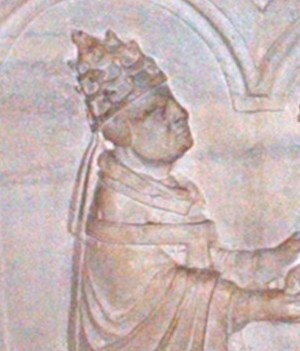
Pope Boniface IX was head of the Catholic Church from 2 November 1389 to his death, in October 1404. He was the second Roman pope during the Western Schism. In this time, the Avignon claimants, Clement VII and Benedict XIII, maintained the Roman Curia in Avignon, under the protection of the French monarchy. He is the last pope to date to take on the pontifical name "Boniface".

Pope Urban VI, born Bartolomeo Prignano, was head of the Catholic Church from 8 April 1378 to his death, in October 1389. He was elected from outside the College of Cardinals. His pontificate began shortly after the end of the Avignon Papacy. It was marked by immense conflict between rival factions as a part of the Western Schism, with much of Europe, such as France, the Iberian Kingdoms of Castile and Aragon, and Scotland recognizing Clement VII, based in Avignon, as the true pope.

Pope Innocent VII, born Cosimo de' Migliorati, was head of the Catholic Church from 17 October 1404 to his death, in November 1406. He was pope during the period of the Western Schism (1378–1417), and was opposed by the Avignon claimant Benedict XIII. Despite good intentions, he did little to end the schism, owing to the troubled state of affairs in Rome, and his distrust of the sincerity of Benedict XIII, and King Ladislaus of Naples.

The papal conclave held from 31 July to 4 August 1903 saw the election of Cardinal Giuseppe Melchiorre Sarto to become pope in succession to Leo XIII, who had died on 20 July after a 25-year-long pontificate. Some 62 cardinals participated in the balloting. Emperor Franz Joseph of Austria asserted the right claimed by certain Catholic rulers to veto a candidate for the papacy, blocking the election of the leading candidate, Cardinal Secretary of State Mariano Rampolla. Sarto was elected on the seventh ballot and took the name Pius X.

The papal conclave that followed the death of Pius VI on 29 August 1799 lasted from 30 November 1799 to 14 March 1800 and led to the selection of Cardinal Barnaba Chiaramonti, who took the name Pius VII. This conclave was held in Venice and was the last to take place outside Rome. This period was marked by uncertainty for the papacy and the Roman Catholic Church following the invasion of the Papal States and abduction of Pius VI under the French Directory.
Angelo II Acciaioli was an Italian Catholic cardinal.
Francesco Moricotti Prignani (Prignano) was an Italian bishop and Cardinal. A cardinal-nephew, he was created Cardinal in 1378 by his uncle Pope Urban VI.

The Archdiocese of Chieti-Vasto is a Latin Church diocese of the Catholic Church which received that name in 1986, when the two separate dioceses, which had been governed by one and the same bishop, were united in one diocese. The diocese of Chieti had become the Archdiocese of Chieti in 1526, when promoted by Pope Clement VII. Chieti is about 8 miles (14 km) south-west of the Adriatic port city of Pescara.

The 1404 papal conclave – the papal conclave of the time of the Great Western Schism, convened after the death of Pope Boniface IX, it elected Cardinal Cosimo Gentile Migliorati, who under the name of Innocent VII became the third pope of the Roman Obedience.

The 1406 papal conclave, the papal conclave of the time of the Great Western Schism, convened after the death of Pope Innocent VII. It elected Cardinal Angelo Correr, who under the name of Gregory XII became the fourth pope of the Roman Obedience.

Rinaldo Brancaccio was an Italian cardinal from the 14th and 15th century, during the Western Schism. Other members of his family were also created cardinals: Landolfo Brancaccio (1294); Niccolò Brancaccio, pseudocardinal of Antipope Clement VII (1378); Ludovico Bonito (1408); Tommaso Brancaccio (1411); Francesco Maria Brancaccio (1633) and Stefano Brancaccio (1681). He was called the Cardinal Brancaccio.

The 1294 papal conclave was convoked in Naples after the resignation of Pope Celestine V on 13 December 1294. Celestine V had only months earlier restored the election procedures set forth in the papal bull Ubi periculum of Pope Gregory X, which had been suspended by Pope Adrian V in July 1276. Every papal election since then has been a papal conclave. It was the first papal conclave held during the lifetime of the preceding pontiff, an event not repeated until the 2013 papal conclave following the resignation of Pope Benedict XVI.

Francesco Gonzaga was an Italian bishop and a Cardinal of the Roman Catholic Church during the reigns of Popes Pius II, Paul II and Sixtus IV.

Marco Cornaro, also known as Cardinal Cornaro and Cardinal Cornelius, was an Italian Roman Catholic cardinal and bishop.
Gianvincenzo Carafa (1477–1541) was an Italian Roman Catholic bishop and cardinal.

Giovanni Vincenzo Gonzaga (1540–1591) was an Italian Roman Catholic cardinal.
Scipione Lancelotti (1527–1598) was an Italian who became a cardinal within the Roman Catholic Church.

Francesco Sforza (1562–1624) was an Italian cardinal and bishop. He was very influential in a number of conclaves.
Ludovico Fieschi was a cardinal during the Western Schism.

Niccolò Brancaccio was born in the Kingdom of Naples, perhaps in Naples itself. He was Archbishop of Bari and then Archbishop of Cosenza, while serving in the Roman Curia in Avignon. He became a cardinal of the Avignon Obedience in 1378, and was Cardinal Priest of Santa Maria in Trastevere and then Cardinal Bishop of Albano. He participated in the Council of Pisa in 1409, and was one of the electors of Pope Alexander V and of Pope John XXIII.













